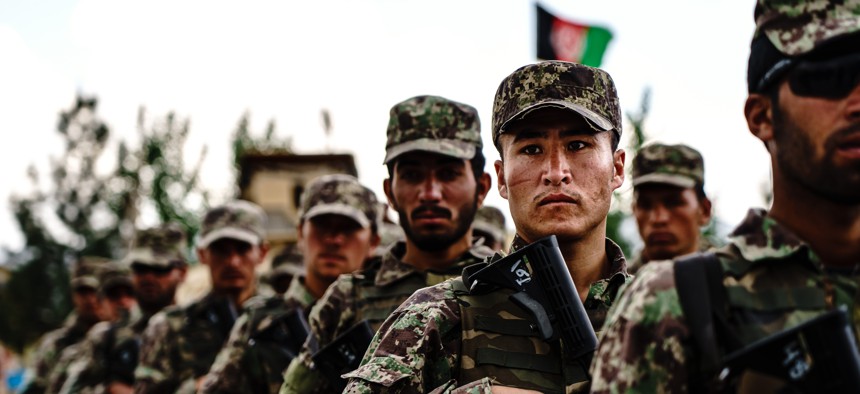
Afghan National Army Special Operations Commandos stand in formation during a visit by Chief of General Staff of the Armed Forces Gen. Mohammad Yasin Zia and his command staff, in Camp Commando, Afghanistan, Wednesday, April 28, 2021. MARCUS YAM / LOS ANGELES TIMES
US Planning to Evacuate Afghan Interpreters, Top US General Says
“There are plans being developed very, very rapidly here,” said Joint Chiefs Chairman Gen. Mark Milley.
ABOARD A MILITARY AIRCRAFT — The Pentagon and State Department are developing plans to evacuate Afghans whose work with the United States has placed them in danger of being killed by the Taliban after U.S. and coalition forces complete their withdrawal, Joint Chiefs Chairman Gen. Mark Milley said Wednesday.
“We recognize that there are a significant amount of Afghans that supported the United States, supported the coalition. And that they could be at risk, their safety could be at risk,” Milley said.
“We recognize that a very important task is to ensure that we remain faithful to them, and that we do what’s necessary to ensure their protection, and if necessary, get them out of the country, if that’s what they want to do.”
About 18,000 interpreters are waiting for approval for a Special Immigrant Visa, which allows interpreters to bring their families to the United States, according to the veterans group No One Left Behind.
Milley spoke to reporters on his plane traveling back to Washington, D.C., after giving the commencement address at the U.S. Air Force Academy, in Colorado Springs, Colo. He did not offer specifics on how the United States would help those interpreters leave the country, such as through airlift, but acknowledged time was quickly running out to help them. U.S. forces are set to leave Afghanistan by September, but that timetable may be pushed up as soon as July, the New York Times reported this week.
Milley said the September deadline was “a no later than” date. “It was never a ‘no earlier than’ date.”
The State Department is leading the planning effort for Afghan interpreters and others who worked with the United States to leave Afghanistan, he said.
“There are plans being developed very, very rapidly here, for not just the interpreters but a lot of other people that have worked with the United States. So there’s a prioritization of categories of these folks. Part of it is the Special Immigrant Visa program, but that’s not all of it. The State Department is working through that and we are in support of that and we are going to do whatever the leadership decides to execute.”
Milley would not say whether the United States was considering using Guam as a temporary harbor for the interpreters while visa issues were worked out.
“We are working through lots of options,” Milley said. “I’m not going to say the specifics of what’s on the table or off the table. Here’s what I would tell you though—we have a moral commitment to those who helped us.”







